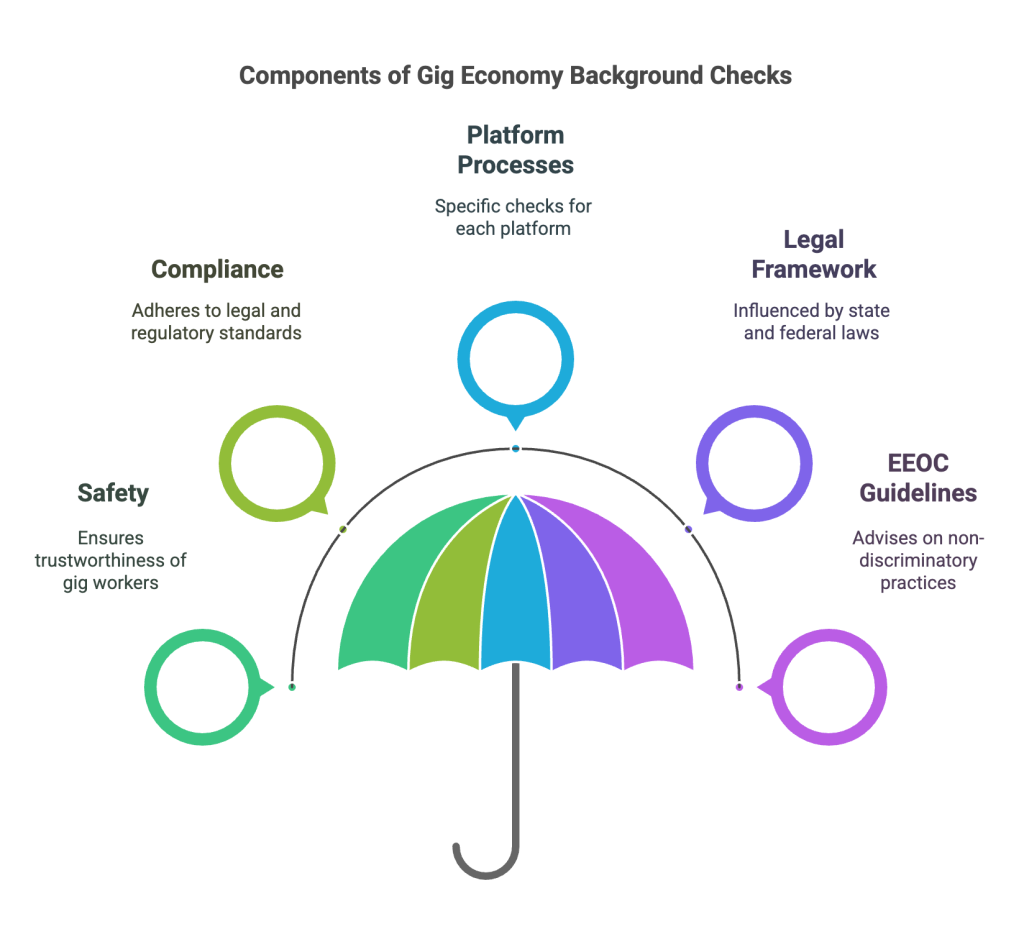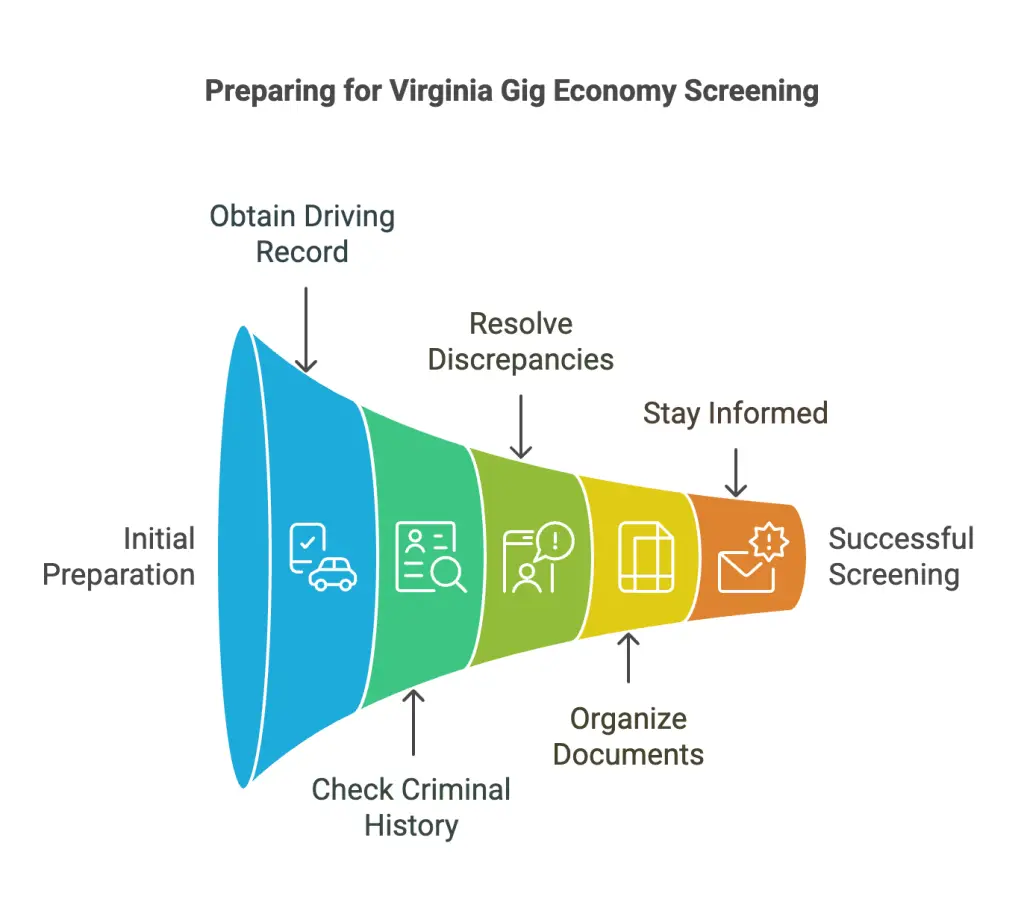The gig economy has transformed the way people work, offering unparalleled flexibility and autonomy. In Virginia, platforms like Uber, Lyft, and various food delivery services have surged in popularity, offering diverse earning avenues for drivers and couriers. However, with this rise comes the need for robust screening processes to ensure safety and reliability for both service providers and consumers. This guide delves into the intricacies of Virginia gig economy checks, exploring how they affect rideshare and food delivery services.
Key Takeaways
- Virginia's gig economy is growing rapidly through platforms like Uber and Lyft, but it requires careful screening to ensure safety and trust.
- Each platform, including rideshare and food delivery services, has specific processes for background checks, which are guided by state and federal laws.
- Potential gig workers should be prepared for thorough screenings that examine driving records and criminal backgrounds to ensure service quality and safety.
- For companies, implementing rigorous screenings helps protect their reputation and attract more trust from consumers.
- By understanding the screening process and staying informed, you can successfully navigate and thrive in Virginia's gig economy.
Introduction
The gig economy in Virginia is thriving, transforming work dynamics through platforms like Uber, Lyft, and food delivery services. These roles have gained popularity due to their flexibility and diverse earning opportunities. But with growth comes the crucial need for rigorous screening to ensure everyone's safety and trust.
Thorough background checks build a secure environment for both drivers and customers. They weed out potential risks and maintain high standards of service. For a gig workforce, where personal interactions are frequent, these checks become indispensable.
Here, you'll learn about the complexities of Virginia's gig economy screenings, focusing on how they impact services like Uber, Lyft, and food delivery. Explore the processes, legal standards, and the balance between opportunity and safety.
Understanding Virginia Gig Economy Checks
Background checks in the gig economy are essential for safety and compliance. They involve verifying the history and reliability of gig workers. For platforms like Uber, Lyft, and food delivery services, these checks are vital. They help ensure that drivers and couriers are trustworthy and maintain the integrity of the services they provide.

Services requiring these checks include Uber and Lyft for rideshare, and platforms like DoorDash, Uber Eats, and Grubhub for food delivery. Each has its own processes to assess driver suitability.
In Virginia, the legal framework for background checks is influenced by both state laws and federal guidelines. The Equal Employment Opportunity Commission (EEOC) plays a key role, advising on non-discriminatory practices during background checks. You can learn more by visiting the EEOC's website. Understanding these checks can help you navigate the gig economy more effectively, whether you're a driver, courier, or a platform looking to maintain high safety standards.
VA Rideshare Screening: Uber and Lyft
When you decide to drive for Uber or Lyft in Virginia, screening is your first step. Itâs not about hurdlesâitâs about ensuring safety and compliance. Hereâs what you can expect during the screening process.
Screening Process Overview:
First, you dive into a driving record check. Virginia law demands a clean sheet, so brace yourself for a review that flags serious violations like DUI or reckless driving. Your vehicle isnât left out either. It undergoes a meticulous inspection to guarantee itâs road-ready and safe for passengers.
Next, there's the criminal background check. Companies use agencies to dig into your past, checking for felonies or serious misdemeanors. The goal? Weed out risks and increase rider confidence.
Legal and Safety Standards:
Virginia backs up these screens with state regulations. The Department of Motor Vehicles (DMV) sets standards, and youâre bound to meet them. Uber and Lyft also abide by these, ensuring uniformity in safety standards across the board. Itâs not just about getting any driver; itâs about trust and safety.
Potential Challenges:
You might run into snags. Maybe a dated ticket from years ago pops up, or your credit report isnât picture-perfect. It helps to keep documents handy. Have your driver's license, vehicle registration, and insurance ready. Being prepared can save time and ease potential stress.
Take control of your screening journey. Understand the âwhyâ behind each step, and turn challenges into opportunities for growth and learning. You're not just meeting requirementsâyou're setting a foundation for a safe and sustainable gig economy future.
Food Delivery Checks in Virginia
Background checks for food delivery couriers like those on DoorDash, Uber Eats, and Grubhub mirror several steps seen in rideshare services, yet differ in some key aspects. The process generally involves a review of your criminal record and driving history, but it might not require vehicle inspections, since couriers often utilize bikes or scooters, in addition to cars.
These checks are crucial for ensuring safety and reliability. A thorough screening process is your first line of defense against potential criminal activity or irresponsible driving, directly affecting consumer trust. An inadequate background check can lead to serious risks, including harm to consumers or damage to the platform's reputation. Ensuring every courier has a clean record protects both the consumer base and the brand.
Virginia has its own set of requirements specifically for food delivery services. While there's no statewide mandate for vehicle inspections, the state's regulations ensure that criminal background checks align with broader public safety laws. This means some offenses might render an applicant ineligible, depending on the severity and timeframe of the conviction.
Navigating these standards successfully can influence your effectiveness and safety as a food delivery courier. What steps are you taking to align with these requirements? Understanding and meeting these standards can make a significant difference in your food delivery journey.
Impact on Gig Workers and Employers
Screening processes in the gig economy directly affect your involvement as a gig worker. For workers, these checks often become the gatekeeper to new income opportunities. They can influence how quickly you can start earning. A clear record generally means a smoother application process. If there are issues in your background, it could delay or prevent job access. Understanding what's in your driving and criminal records, and addressing inaccuracies, can preempt some challenges.
For companies, thorough screenings offer substantial benefits. They play a crucial role in protecting their reputation. Trustworthy services attract and retain consumers. When your company consistently performs background checks, it helps to ensure the safety of both the provider and the user of the service. This builds confidence in the brand, making it a preferred choice for customers. Does your company value trust? Screening might just be your best asset in achieving it.
Navigating the Screening Process
When diving into the Virginia gig economy, preparation is crucial. Letâs break it down. First, arm yourself with information. Understand what's involved. Youâll typically face checks on your driving record and criminal history. Uber, Lyft, and most delivery platforms follow this protocol. How can you get ready? Start by requesting your driving record from the DMV. This way, you know what's on it before they do. Check your criminal history, too. You can order a personal report to see what might appear in the background check.
Watch out for common pitfalls. Sometimes, outdated or incorrect data surfaces. Be proactive in resolving discrepancies by contacting the reporting agency. Communication is key. If something seems off, donât hesitate to reach out and ask for clarification or corrections.
Keep your documents organized and up-to-date. This includes proof of insurance and vehicle registration. Many applications get delayed simply because of missing or expired documents.
Approach the process with patience. Background checks can take time, but staying prepared helps. Stay engaged, check your email regularly for updates, and respond quickly to any requests for additional information.

Understanding the process and preparing thoroughly can save you from unnecessary hassles. This approach not only helps you through the initial checks but also builds confidence for future tasks, paving the way for successful gig work.
Conclusion
Virginiaâs gig economy is not just a trend; it's here to stay. It's essential to acknowledge the role of comprehensive background checks in maintaining this sector's safety and reliability. Through this lens, we've explored how screening impacts both individuals and companies engaging with platforms like Uber, Lyft, and food delivery services.
Thorough screenings aren't merely bureaucratic hoops. They safeguard against potential risks, fostering trust for everyone involved. For consumers, this means confidence in the safety of their rides and deliveries. For businesses, it's about upholding a reputation that prioritizes security.
If you're entering this dynamic workforce, understanding and navigating the screening process is crucial. It's not just about ticking boxes but about ensuring a secure and professional working environment. Embrace the requirements, arm yourself with knowledge, and approach your gig work with the assurance of a well-prepared entrant.
Additional Resources
When you're navigating background checks in the gig economy, having reliable resources at your fingertips is invaluable. For starters, Gig Economy Insights offers a treasure trove of articles, tips, and updates. It's an excellent resource to keep pace with changes in the industry and learn from experts who share their experiences in real-world scenarios.
Understanding the legal aspects of employment screening is equally crucial. The EEOC's guidance is a must-read. They provide clear, actionable guidelines on how screenings should be conducted, ensuring they meet federal standards for fairness and legality. This insight helps both companies and workers know their rights and responsibilities.
Additionally, checking state-specific requirements for rideshare and delivery services can shed light on any unique regulations that might affect you. Many state websites offer sections dedicated to workforce development and employment laws. Reviewing these can spare you surprises later.
Lastly, staying connected with community forums and networking groups can be beneficial. These platforms often discuss industry trends, share firsthand experiences, and offer support from peers who understand the challenges of the gig economy. Engaging with these resources helps you stay informed and prepared.
Frequently Asked Questions (FAQs)
What disqualifies you from Uber in Virginia?
You may be disqualified from driving for Uber in Virginia if you have certain criminal convictions, a history of unsafe driving, or an invalid driver's license. Serious offenses such as DUI, violent crimes, or recent reckless driving can be disqualifying.
Does Lyft check criminal history in VA?
Yes, Lyft conducts a criminal background check for all applicants in Virginia. This ensures that drivers meet safety standards before they begin driving.
Can a DUI affect gig work in VA?
Yes, a DUI can impact your eligibility for gig work in Virginia. Many companies disqualify applicants with recent DUI convictions due to safety concerns.
How often do gig companies recheck backgrounds in VA?
Gig companies typically recheck backgrounds annually to ensure ongoing compliance and safety. This varies by company, so it's important to verify with each provider.
Are VA gig workers considered employees?
No, gig workers in Virginia are generally classified as independent contractors. This distinction affects benefits and responsibilities in comparison to traditional employees.
Can you appeal a gig check denial in Virginia?
Yes, you can appeal a gig work background check denial. Reach out to the company and provide any additional documentation or clarification to support your case.
Do gig companies check credit history in VA?
Most gig companies focus on criminal and driving records rather than credit history. However, it's always best to confirm with each company as practices can vary.
How far back do Uber checks go in VA?
Uber typically reviews records from the past seven years. This includes both criminal and driving history checks.
Are misdemeanors a problem for gig work in VA?
Misdemeanors may not automatically disqualify you, but serious or violent misdemeanors might. Each case is evaluated individually based on company policies.
Do delivery drivers need fingerprinting in Virginia?
Most delivery services in Virginia do not require fingerprinting. However, they do perform background checks to ensure driver safety.
What driving record issues can disqualify you from gig work?
Infractions such as excessive speeding, multiple accidents, and reckless driving can disqualify you from gig work due to safety concerns.
Do gig companies offer insurance for workers in VA?
Many gig companies provide limited insurance for accidents occurring while on the job. It's important to review each company's policy for specifics.
Can previous employment affect your gig work application in VA?
Previous employment generally does not affect your application unless it involves driving-related infractions relevant to the gig work.
What age do you need to be to work for gig companies in VA?
Typically, you need to be at least 18 or 21, depending on the type of service, such as ride-sharing or delivery services. Verify age requirements with each company.
Definitions
Background Check - A background check is a review of an individualâs criminal record, driving history, and other relevant details to assess their suitability for a job. Companies like Uber and Lyft require these checks to ensure drivers meet safety standards and do not pose risks to customers.
Compliance - Compliance refers to following legal and regulatory requirements set by local, state, or federal authorities. In the gig economy, companies must comply with employment laws and industry-specific rules, such as background screening guidelines for rideshare and delivery drivers.
Equal Employment Opportunity Commission (EEOC) - The EEOC is a federal agency that enforces laws against workplace discrimination. It provides guidance on fair hiring practices, including how background checks should be conducted to prevent discrimination based on race, gender, or other protected categories.
Driving Record - A driving record is an official document that tracks a personâs history of traffic violations, accidents, and license suspensions. Rideshare platforms scrutinize this record to ensure drivers have a safe driving history before allowing them to work.
Screening Process - The screening process refers to the steps involved in verifying an applicantâs background before they can begin working. This can include identity verification, criminal history checks, and driving record reviews to confirm that candidates meet safety and reliability standards.

GCheck Editorial Team
Meet the GCheck Editorial Team, your trusted source for insightful and up-to-date information in the world of employment background checks. Committed to delivering the latest trends, best practices, and industry insights, our team is dedicated to keeping you informed.
With a passion for ensuring accuracy, compliance, and efficiency in background screening, we are your go-to experts in the field. Stay tuned for our comprehensive articles, guides, and analysis, designed to empower businesses and individuals with the knowledge they need to make informed decisions.
At GCheck, we're here to guide you through the complexities of background checks, every step of the way.





